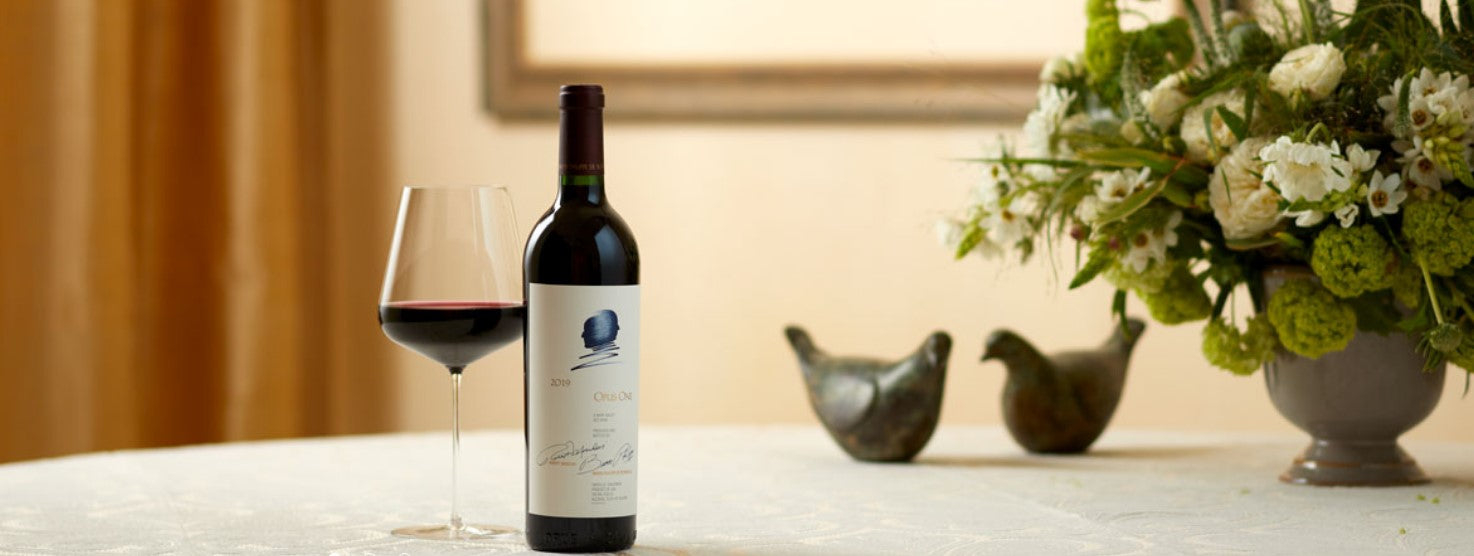
Opus One Winery in Napa Valley
Opus One is a winery deeply rooted in the history of Napa Valley, representing a unique partnership between two of the wine world's most respected figures: Robert Mondavi and Baron Philippe de Rothschild. The collaboration was born out of a shared vision to create a singular wine that would stand in the company of the world’s finest. This article delves into the origins, philosophy, and wines of Opus One, exploring its significance in the global wine industry.
Origins and Vision
Opus One's inception in the late 1970s marked a watershed moment for the Napa Valley wine region and the broader wine world. Robert Mondavi, an American wine industry pioneer, and Baron Philippe de Rothschild of the renowned Château Mouton Rothschild in Bordeaux, France, sought to fuse their winemaking philosophies and traditions to produce a wine that would embody the best of both their worlds. The first vintage was released in 1979, quickly garnering acclaim and setting the stage for Opus One to become a symbol of luxury and quality.

The Winery and Vineyards
Located in Oakville, Napa Valley, the Opus One winery is a testament to the fusion of French and American styles, not only in winemaking but also in architecture. The winery's design, which combines elements of modernity with traditional European influences, provides an elegant backdrop to the meticulous winemaking process that takes place within.
The vineyards of Opus One are meticulously managed with a focus on sustainable and organic practices, reflecting a deep respect for the land and its potential to produce wines of extraordinary character. The estate's dedication to terroir-driven viticulture is evident in the complex, balanced wines it produces.
The Wine
Opus One is synonymous with a single, proprietary Bordeaux-style blend, reflecting the founders' dedication to creating a wine that is greater than the sum of its parts. Typically made from a blend of Cabernet Sauvignon, Merlot, Cabernet Franc, Petit Verdot, and Malbec, each vintage of Opus One is a reflection of the year's unique climatic conditions, crafted with the intention of achieving harmony and balance.
The wine itself is known for its elegance, complexity, and aging potential, often displaying a rich array of flavors and aromas, including dark fruit, cedar, and spices. The commitment to quality at every step of the winemaking process, from vineyard to bottle, ensures that each vintage of Opus One continues to uphold the legacy of its founders.
Global Recognition and Impact
Opus One has played a pivotal role in elevating the status of Napa Valley wines on the global stage, demonstrating that American wines can compete with the world’s oldest and most esteemed wine regions. Its success has paved the way for other ambitious winemaking projects in Napa Valley and beyond, contributing to the dynamism and innovation that characterizes the modern wine industry.

Conclusion
Opus One stands as a monument to the vision of its founders and a testament to the potential of Napa Valley as a premier winegrowing region. Its commitment to quality, sustainability, and the blending of tradition and innovation continues to inspire wine lovers and winemakers around the world. As Opus One evolves, it remains anchored in the principles that have made it a symbol of excellence in winemaking, reflecting the enduring legacy of Robert Mondavi and Baron Philippe de Rothschild.

FAQ
1. What is the Opus One Meaning?
"Opus One" is primarily known as a prestigious wine brand from Napa Valley, California. It was established as a joint venture between two of the wine world's titans, Robert Mondavi and Baron Philippe de Rothschild. The name "Opus One" symbolizes the first joint venture between these two wine industry giants, representing a singular work ("opus" meaning work in Latin, and "one" indicating the first of its kind). The winery produces a premium Bordeaux-style blend which has garnered international acclaim for its quality and craftsmanship.
The term "opus" itself is often used in the art and music world to denote a work, usually followed by a number to indicate the chronological order of an artist's works. Opus One, therefore, connotes a masterpiece or significant work in the context of wine, suggesting that it is a standout achievement of its creators.
2. Who owns Opus One?
Opus One is a joint venture between two prominent figures in the wine industry: Baron Philippe de Rothschild of the famous Château Mouton Rothschild in Bordeaux, France, and Robert Mondavi, a leading figure in the Napa Valley wine community. This partnership was established in 1979.
After the deaths of the original founders, the ownership of Opus One continued through their respective companies. As of my last update, Opus One is owned jointly by Baron Philippe de Rothschild S.A. and Constellation Brands, which acquired Robert Mondavi's winery in 2004. This joint ownership ensures that the legacy and vision of its founders continue to influence the winery's operations and the quality of its wines.
3. Why is Opus One so expensive?
Opus One is renowned for its high price due to several key factors that underscore its reputation and production:
- Prestigious Partnership: The winery was founded as a collaboration between two of the wine world’s most iconic figures: Robert Mondavi of California and Baron Philippe de Rothschild of Château Mouton Rothschild in Bordeaux. This merger of New World and Old World wine-making philosophies and practices created a brand that was prestigious from its inception.
- Limited Production: Opus One is known for its strict quality control measures, which include reducing yield to ensure higher quality grapes. This limited production naturally drives up the price due to scarcity and high demand among collectors and enthusiasts.
- Quality of the Vineyards: The grapes used in Opus One come from some of the best vineyards in the Napa Valley, particularly in Oakville, which is renowned for producing exceptionally high-quality Cabernet Sauvignon. The cost of maintaining such vineyards is high, contributing to the overall price of the wine.
- Winemaking Process: Opus One benefits from a meticulous winemaking process that combines traditional techniques with modern technology. This process ensures a consistently high-quality product but also adds to the cost of production.
- Aging and Barrel Costs: The wine is aged in new French oak barrels, which are expensive themselves. The aging process also involves a significant investment in time, as the wine needs to be stored under optimal conditions for many months before it can be sold.
- Brand Prestige and Market Demand: As with many luxury goods, the price of Opus One also reflects its status as a symbol of prestige and luxury in the wine market. Its reputation allows it to command higher prices, particularly in international markets where it is highly sought after.
These factors combined ensure that Opus One remains not just a wine, but a luxury brand, with prices to match its high status in the world of fine wines.
4. Where to buy Opus One wine?
There are a few websites that advertise Opus One but they don't actually have it in stock. You may have come across many sites with this issue. DrinkFly actually stocks Opus One wine with many different years available.
